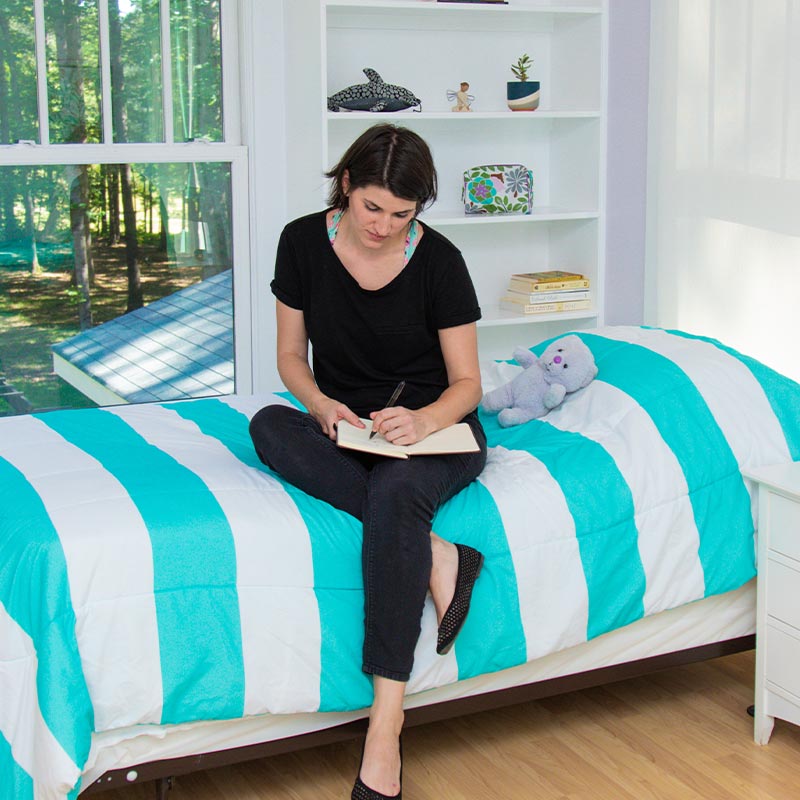Carolina House proudly serves people of all genders age 18 and older from across the country. We specialize in supporting individuals who are struggling with post-traumatic stress disorder.
PTSD Treatment
Learn more about PTSD treatment at Carolina House in North Carolina
When an individual is struggling with PTSD, he or she often faces a myriad of complexities that make recovery challenging. PTSD tends to be very intricate, and often come along with a co-occurring mental health condition. Thankfully, relief from this disorders can be found at professional treatment and rehab centers specializing in PTSD.
At Carolina House, located in North Carolina and also serving South Carolina and all states nationwide, it is our main priority to help those who are struggling with mental health conditions, such as PTSD. We understand that PTSD can pose a series of negative problems to develop in an individual’s life. Therefore, we supply evidence-based treatments to these individuals at our center for PTSD treatment and rehab so that they can establish a safe and effective recovery that keeps them healthy for a lifetime.
How to Help a Loved One
Helping a loved one get treatment for posttraumatic stress disorder
When your loved one is battling a mental health condition like PTSD, it can be incredibly hard to watch. You likely feel as though you have done everything you can to help your loved one get the treatment and rehab at a professional center that he or she needs to recover, but have been left feeling defeated and unaccomplished. However, despite feeling as though there is nothing that left for you to do for your loved one, there are things that you can do on a regular basis to help him or her realize the benefits of recovery.
For starters, it is critical that you obtain as much information as possible about PTSD so that you can recognize the symptoms, effects, and causes of this type of condition. Additionally, spend time researching PTSD so you have a better understanding of what this mental illness entails. By doing your homework, you can develop insight into what your loved one is experiencing, as well as arm yourself with the knowledge needed to move forward in this process of finding appropriate a treatment and rehab center that specializes in PTSD for him or her.
It is important to look up what treatment and rehab centers care for PTSD so that, if and when your loved one reaches out for help, you will be prepared to supply him or her with the appropriate resources. This information is something that you always want to be ready with, so that when the time comes for your loved one to enter treatment and rehab at a center that specializes in PTSD, you can get him or her admitted quickly.
Even though you are probably anxious to get your loved one into treatment and rehab at a high-quality center as soon as possible, it is important not to become too pushy. This approach can set your loved one’s treatment back, which is exactly what you do not want to do. Therefore, go at his or her pace, all while continually reminding him or her that you are there to support him or her and listen when it is needed.
It is not uncommon for an individual who is suffering from a condition like PTSD to consider suicide. Therefore, it is critical that you work with mutual loved ones of the afflicted individual to develop a plan for if he or she becomes suicidal.
When your loved one accepts treatment and rehab at a center for PTSD and is going through the process of recovery, it is imperative that you remain supportive. Your support is the most important thing for your loved one at this time, as it will help him or her continue to feel encouraged to keep moving forward in his or her recovery.
Why Consider Treatment
Why consider treatment for PTSD at Carolina House in North Carolina
Someone who is faced with PTSD will likely experience a range of different consequences. Psychologically, symptoms of one’s PTSD can lead to suicidal ideations, anxiety, intense flashbacks, and depression. An individual who is battling PTSD will also likely face strained relationships with friends and family, problems at work, potential unemployment, homelessness, divorce, loss of custody of children, and more. Despite these heartbreaking effects, there is gender-inclusive treatment available to those who want to get better. With proper treatment from a PTSD rehab center like Carolina House, located in North Carolina and also serving South Carolina and all states nationwide, recovery is possible.
Types of Treatment
Types of PTSD treatment offered at Carolina House in North Carolina
Since 2006, we, at Carolina House, have been devoted to providing world-class, gender-inclusive residential treatment and rehab to those who are in need of comprehensive treatment to overcome the symptoms of PTSD. Situated in a serene, wooded setting, Carolina House offers clients of all genders age 18 and older a tranquil environment that is fully conducive to true and lasting healing. We hold ourselves to a standard of excellence in the care we deliver so that those who engage in treatment and rehab at our center for PTSD with us can succeed in discovering a renewed life of wellness.
At Carolina House, located in North Carolina and also serving South Carolina and all states nationwide, we have made it our goal to provide a beautiful, safe, and nurturing environment that is run by highly trained and supportive staff. We use a structured, multifaceted treatment and rehab approach at our center for posttraumatic stress disorder that is designed to usher clients successfully into life-long recovery. Our treatment approach also encourages self-exploration towards transformation through self-nurturing expressions of living. This goal and these treatment and rehab approaches are met by providing clients with individualized treatment plans that are catered to meet each of their very unique needs. Various aspects that may be incorporated into these treatment and rehab plans at our PTSD treatment center are described in the following:
Medication management: When individuals are battling symptoms of PTSD, the use of certain medications may be recommended in order to help alleviate some of their distress. Clients at our treatment and rehab center for PTSD have the opportunity to meet with a psychiatrist once or twice a week in order to determine the need for any medication, as well as to monitor the therapeutic effectiveness of any medication prescribed.
Individual therapy: Clients are provided with one full individual therapy session each week that typically lasts between 45 and 60 minutes. Additionally, clients will meet with their therapists for one or two brief check-in sessions each week, each of which may last anywhere between 20 and 40 minutes. These sessions are designed to provide clients with an opportunity to meet in a private, confidential setting with their therapists so that they can discuss their progress in treatment, process through any setbacks that may have arisen, and celebrate any successes that have occurred while in treatment and rehab for PTSD at our center.
Family therapy: Recognizing how important family involvement can be in our clients’ successful recovery from PTSD, the staff at Carolina House, located in North Carolina and also serving South Carolina and all states nationwide, frequently incorporates family therapy into our clients’ treatment plans. Family therapy sessions are typically offered on a weekly basis, meeting for an average of 45 to 60 minutes for each session. If deemed appropriate and therapeutically beneficial to clients, additional family sessions may be added on an as needed basis.
Group therapy: When working to overcome PTSD, group therapy sessions have proven to be incredibly beneficial and effective. Clients typically participate in an average of six group therapy sessions each weekday, four group sessions on Saturdays, and two group sessions on Sundays. These group therapy sessions are typically broken down as follows:
- A variety of other groups occur during the week as well, including both process and psychoeducational groups. The topics that are covered during these sessions vary but may include discussions on body image, media awareness, empowerment, relapse prevention, nutrition, and guided self-care, among many others.
- Two Food and Feeling Groups take place every day. These are short, skills identification groups that occur after every lunch or dinner.
- Dialectical Behavior Therapy (DBT) Groups take place three times per week and are facilitated by a licensed clinical social worker who is specially trained in DBT.
- Interpersonal Process Groups occur three times per week and are dually led by a licensed professional counselors and other qualified professionals who have been fully trained in the group modality.
- Two Integrated Health Groups take place each week, including Addictions Education and 12-Step Facilitation. These are led by a licensed clinical addictions specialist and are attended by all clients. Weekly AA and NA meetings are also made available to clients who need them.
Experiential therapy: In order to offer clients a holistic approach to the treatment, Carolina House offers a number of experiential therapy options at our PTSD treatment and rehab center in addition to the more traditional therapeutic interventions. Examples of these therapies include the following:
- Culinary Group
- Yoga therapy
- Art therapy
- Games
- Strength training
- Embodying Recovery (a sensorimotor psychotherapy group)
- Body movement activities
- Walks
Additionally, keeping in mind that recovery is an ongoing process, the staff at Carolina House is dedicated to ensuring that clients have a definitive plan set in place prior to their being discharged. From the time of admission to our treatment and rehab center for posttraumatic stress disorder, clients’ primary therapists are assessing their outside resources and determining what services need to be in place in order to support a smooth discharge plan. Typically, the goal will be to step down to a lower level of care slowly so that clients can be fully prepared for increased independence.
If you or a loved one is suffering from an PTSD, the staff at Carolina House wants to help. Located in North Carolina and also serving South Carolina and all states nationwide, our world-class programming at Carolina House can help you overcome the symptoms that plague you, while also assisting you to develop the confidence needed to embark on a bright and promising future. Do not continue to suffer. Let the staff at Carolina House show you that there’s a better way to live.











